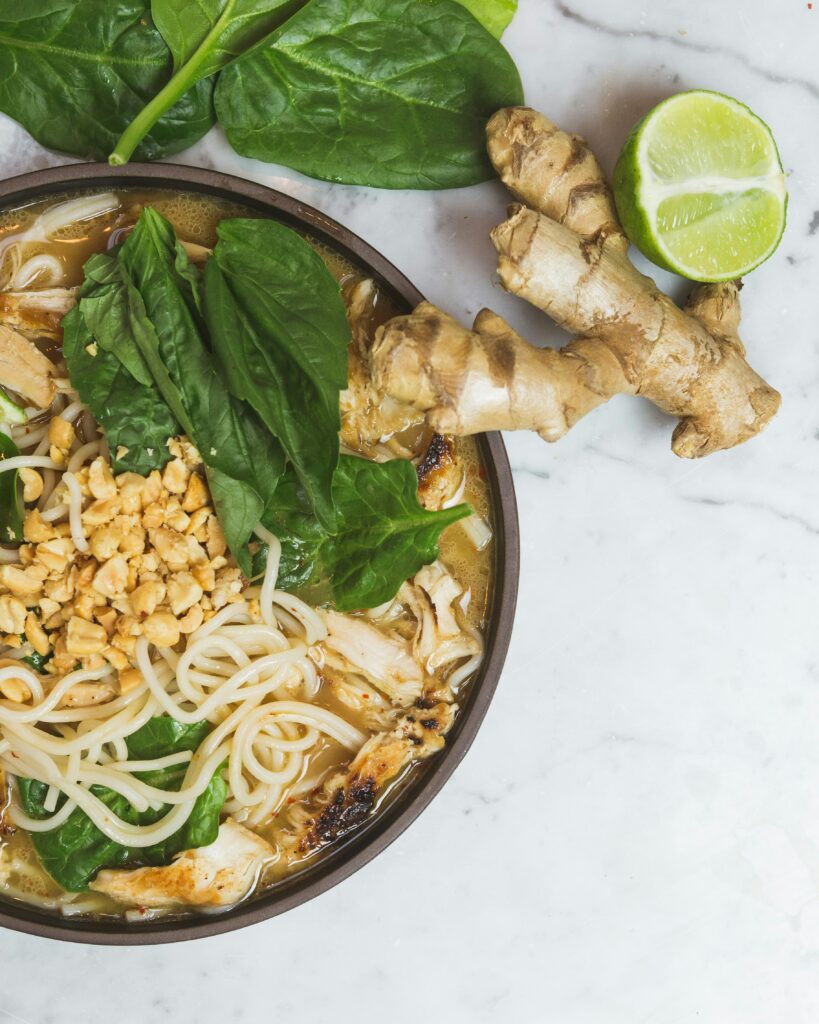
Leaky gut is a complex condition that can contribute to various gut and inflammatory health issues. (For a refresher on what leaky gut is click here!) Healing leaky gut requires a holistic approach that addresses diet, gut health, lifestyle, detoxification, and supplementation.
Nutrition: The Foundation of Gut Healing
1. Increase Whole, Nutrient-Dense Foods
To build an anti-inflammatory gut health diet, focus on whole foods like vegetables, fruits, proteins, and unprocessed starches (potatoes, rice, quinoa). Bone broth, fatty fish, like salmon, and spices like turmeric and ginger are particularly healing for the gut. Limit processed foods, especially those with canola oil, added sugars, and artificial sweeteners.
2. Identify and Eliminate Food Sensitivities
If you suspect you have food sensitivities, eliminate them while healing your gut. If you are not sure of having a food sensitivity, eliminate the 2 most common triggers: gluten and dairy. Eliminate these foods completely for 3-4 months. Then reintroduce them one at a time to assess reactions. Avoid food sensitivity tests while healing, as leaky gut can cause widespread immune responses to foods that are innacurate.
3. Slow Down and Chew Your Food
Proper digestion starts with mindful eating. Eating in a calm state enhances digestive enzyme release and prevents undigested food from aggravating the gut lining.
Gut Microbiome Support
1. Promote Good Gut Bacteria
Support beneficial bacteria by consuming probiotic-rich foods like sauerkraut, kimchi, kefir, and yogurt. Prebiotic fibers from whole foods (vegetables, fruits, whole grains) also nourish gut bacteria.
2. Address Bacterial Imbalances
If you experience chronic bloating, constipation, or extreme diet restrictions, consider working with a pracitioner to order a comprehensive microbiome test to identify microbial imbalances, bacterial overgrowths, or inflammation.
Lifestyle Considerations for Leaky Gut
1. Manage Stress
Chronic stress disrupts gut health by affecting digestion and gut bacteria via the vagus nerve. Implement stress management techniques such as:
- Meditation (Calm app, insight timer, guided meditations)
- Somatic exercises
- Restorative yoga
- Deep breathing
- Limbic system retraining
2. Limit Alcohol and Medication Overuse
Alcohol irritates the gut lining, so consider minimizing or eliminating intake. Additionally, avoid long-term use of antibiotics, NSAIDs, PPIs, and oral contraceptives unless medically necessary.
3. Support detox and reduce Toxin Exposure
Opt for organic produce when possible (especially the Dirty Dozen) and choose non-toxic home and personal care products. Download my non-toxic wellness guide here.
Incorporate detoxifying foods such as:
- Cruciferous vegetables (broccoli, cabbage, Brussels sprouts)
- Alliums (garlic, onions, shallots)
- Herbs and spices (cilantro, oregano, turmeric, dandelion)
*If you have known exposure to mold, heavy metals, or pesticides, seek guidance from a holistic practitioner for safe detoxification.
Supplements for Healing Leaky Gut
Supplements that have been shown to help with leaky gut:
- Spore-Based Probiotic (MegasporeBiotic) – This unique probiotic has been shown in studies to supports gut barrier and decrease leaky gut.
- L-Glutamine – This amino acid helps repair gut lining, particularly beneficial for IBS, IBD, and gluten intolerance.
- Vitamin D (Thorne D3 + K2) – Vitamin D is well studied to support the immune system and gut barrier integrity.
Request access to supplements here
Where to Start?
If you’re overwhelmed, focus on these three core areas:
- Diet: Prioritize whole foods and eliminate known food sensitivities.
- Stress Management: Implement relaxation techniques to support digestion and healing.
- Supplements: Begin with a probiotic, L-glutamine, and vitamin D for foundational support.
If you’re struggling with persistent symptoms despite these efforts or feeling confused on where to start, check out my one-on-one services!
Disclaimer: This content is for informational and educational purposes only and is not intended as medical advice. Always consult with a qualified healthcare provider before making any changes to your diet, lifestyle, or supplement regimen.